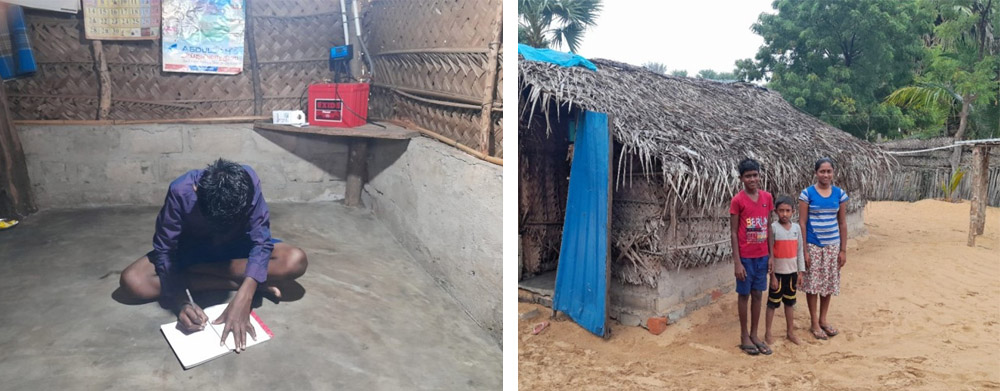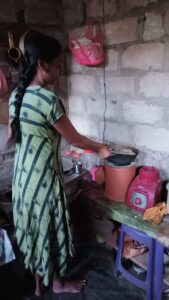Renewable Energy for Sustainable Prosperity
A case study from Maratimpatru DS division in Mullaitivu district Sri Lanka
 Karthika, a 32 year old, is a fulltime homemaker, and her husband, Thilidas, who is 34 years old is a fisherman, and they have a 12 year old son together. The current economic crisis of the country has aggravated the financial situation of low-income families, including fishing families like Karthika and Thilidas who are living with low socio-economic status. Fishing has consistently ranked as one of the most hazardous occupations, therefore, Thilidas fears for his life and wellbeing of his family should something devasting happens to him. Owing to the risks involved, Thilidas has limited his fishing to late morning and dusk reducing his income to around LKR 35,000 per month. The monthly income is insufficient to support the family.
Karthika, a 32 year old, is a fulltime homemaker, and her husband, Thilidas, who is 34 years old is a fisherman, and they have a 12 year old son together. The current economic crisis of the country has aggravated the financial situation of low-income families, including fishing families like Karthika and Thilidas who are living with low socio-economic status. Fishing has consistently ranked as one of the most hazardous occupations, therefore, Thilidas fears for his life and wellbeing of his family should something devasting happens to him. Owing to the risks involved, Thilidas has limited his fishing to late morning and dusk reducing his income to around LKR 35,000 per month. The monthly income is insufficient to support the family.
Karthika further explained how providing three meals a day for the family has now become difficult due to scarcity of kerosene and firewood in addition to reduced income. In order to save money spent on sources of illumination in the evening and night, Karthika is forced to prepare meals during daylight. She stated, “Currently, we are using candles for lighting purposes. The cost of a candle was LKR 4.00, now it has increased to LKR 18.00. We use at least 8 to 10 candles per night, therefore, we spend approximate LKR 5,000 per month on candles. This is money that could
kerosene and firewood in addition to reduced income. In order to save money spent on sources of illumination in the evening and night, Karthika is forced to prepare meals during daylight. She stated, “Currently, we are using candles for lighting purposes. The cost of a candle was LKR 4.00, now it has increased to LKR 18.00. We use at least 8 to 10 candles per night, therefore, we spend approximate LKR 5,000 per month on candles. This is money that could be spent on food, medicine and school books for our son.” Karthika continued, “Sometimes we are forced to spend the night at a neighbour’s house as we do not have proper lighting at home. Lack of lighting compromises the safely of my family, especially on days my husband goes fishing.”
be spent on food, medicine and school books for our son.” Karthika continued, “Sometimes we are forced to spend the night at a neighbour’s house as we do not have proper lighting at home. Lack of lighting compromises the safely of my family, especially on days my husband goes fishing.”
Sahursan, the son, stated that he is finds it difficult to study and complete his homework due to poor lighting. Sahuran affirmed, “We are unable to affored sufficient candles and kerosene for me to study during the night. I therefore, try to finish homework during school hours without playing with my friends. I even got punished as I am not able to complete my homework. I do feel very sad.”
Fortunately for the family of Karthika and Thilidas, the project; “Emergency Support Initiative for Green Building-based Prevention and Control Measures for Vulnerable Communities” was introduced. The project was developed with the intention of reducing the urgent risks associated with poor structures of houses and to contribute safer and cleaner cities in the Asia and Pacific region during the COVID-19 pandemic through green building initiatives. The project is implemented by UN-Habitat with the financial assistance of the Government of Japan. Theerththakkarai in Chilawaththai Grama Niladhari Division where the family of Karthika and Thilidas lives is one of the villages supported under the project.
Thilidas, while sharing his joy stated that the off grid solar panel has ended the problems that they faced in obtaining power supply during the night, especially for lighting. Now he is comfortable to leave his family in the night to go fishing and therefore, is now able to earn more money.

Karthika, is happy that her lifestyle has improved drastically due to having lighting and also with the introduction of the energy efficient cooking stove. She is not only able to prepare quality food but also the efficiency of the stove has helped in reducing the cost energy and time. Karthika further stated, I am able to use Palmyra charcoal which is cheaper than coconut charcoal, and is similar to a LP gas stove.” Karthika thanked UN-Habitat for providing the solar panel and energy effient cooking stove, including the provision of the technical awareness and training in handling and maintence.
thanked UN-Habitat for providing the solar panel and energy effient cooking stove, including the provision of the technical awareness and training in handling and maintence.
Sahursan, has expressed his joy, as he is now able to spend more time on his school work and studies during the night. Furthermore, he said, “Now I am able to join my friends to play and I do not get punished anymore for not attending to homework.” Sahursan is now joined by two of his friends Kansika, studying in grade 10, and Sansihan, studying in grade 3 during the night for studies. Sahursan said, “I am happy that I am able to help my friends. We have lighting when the entire village goes darking during power cuts.”
Finally, the whole family expressed their appreciation to the donor, district and divisional administration, UN-Habitat and the implementing team for the and requested to that the project be extended to those families as well other families in need.
